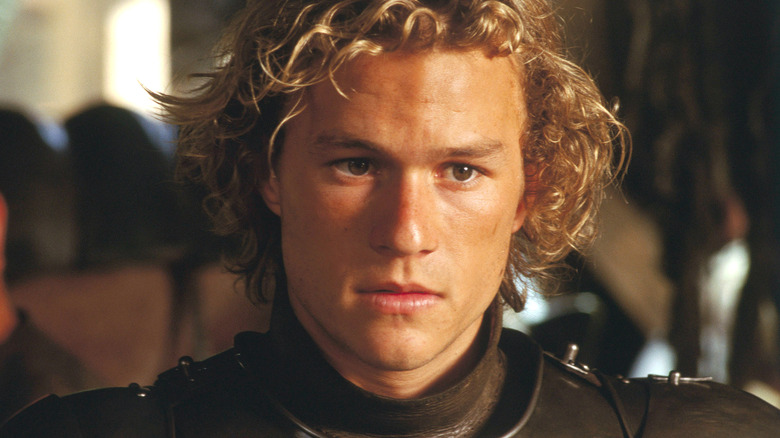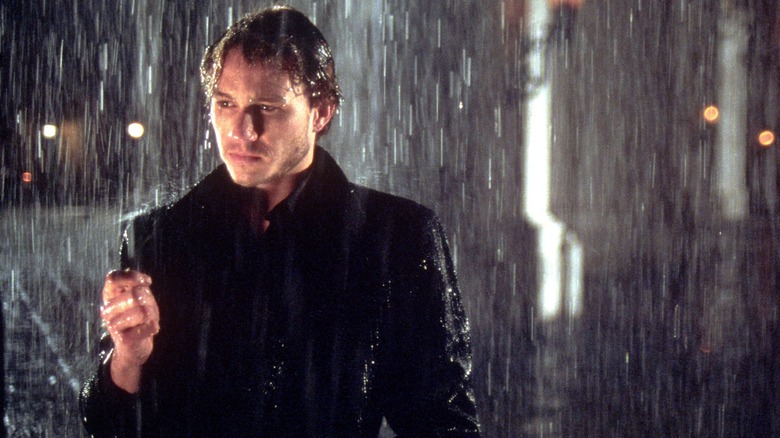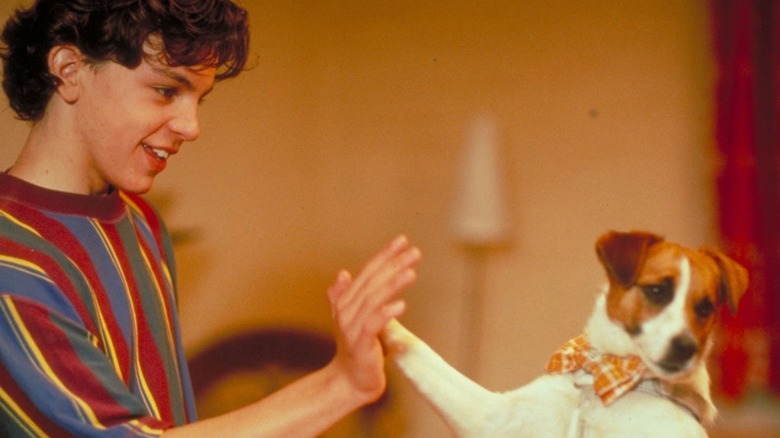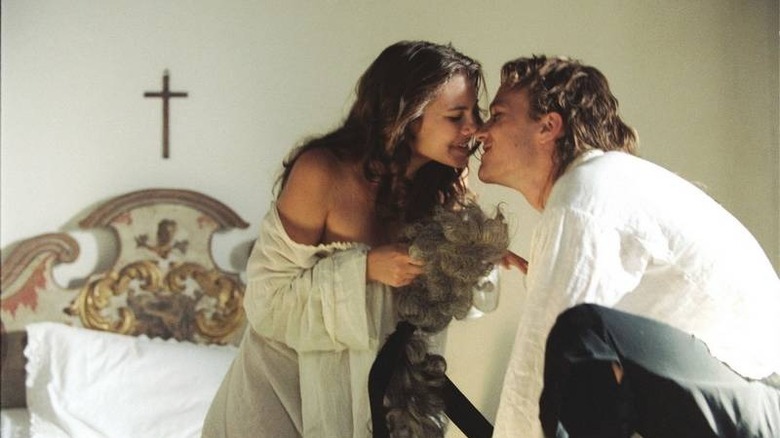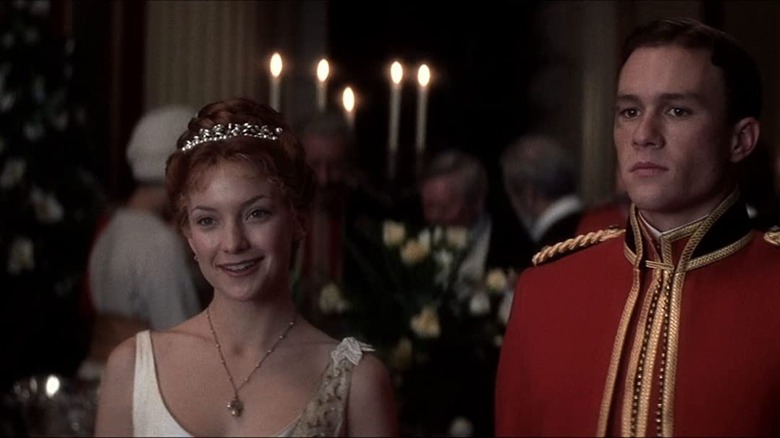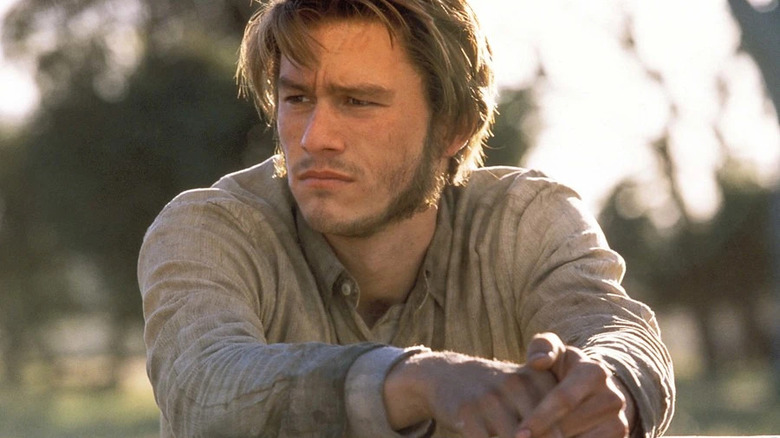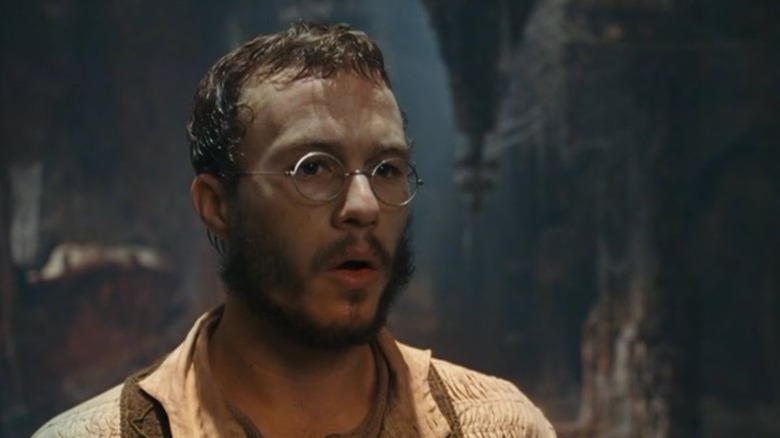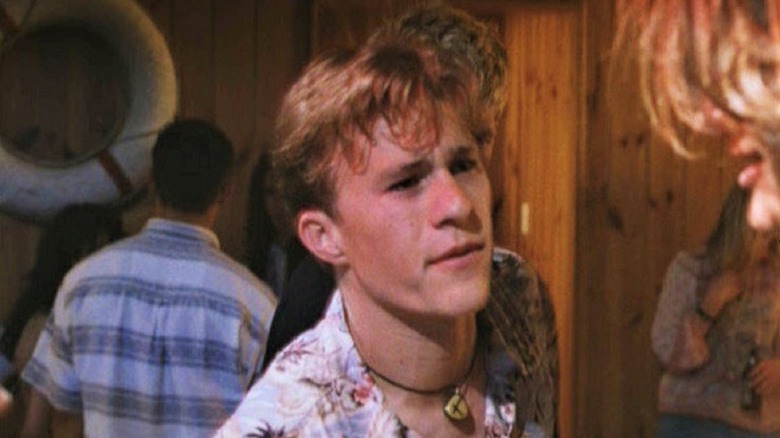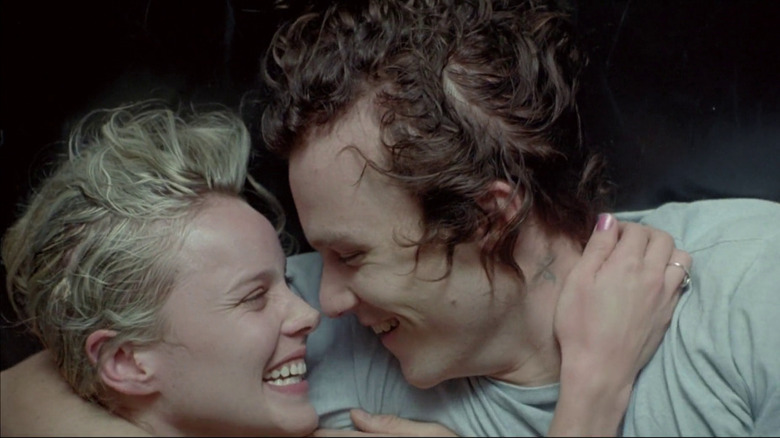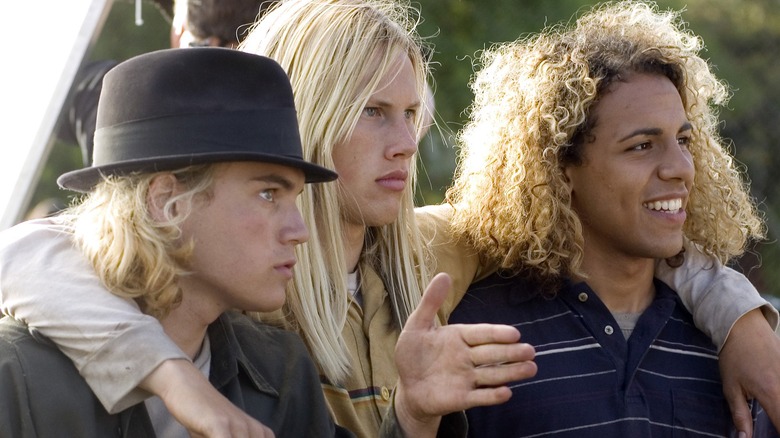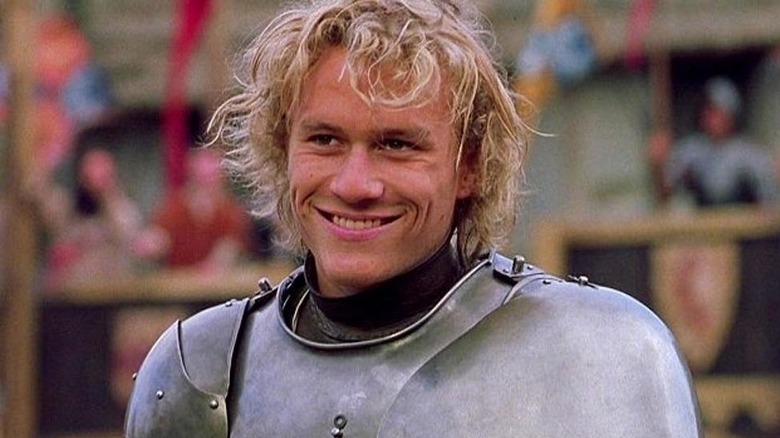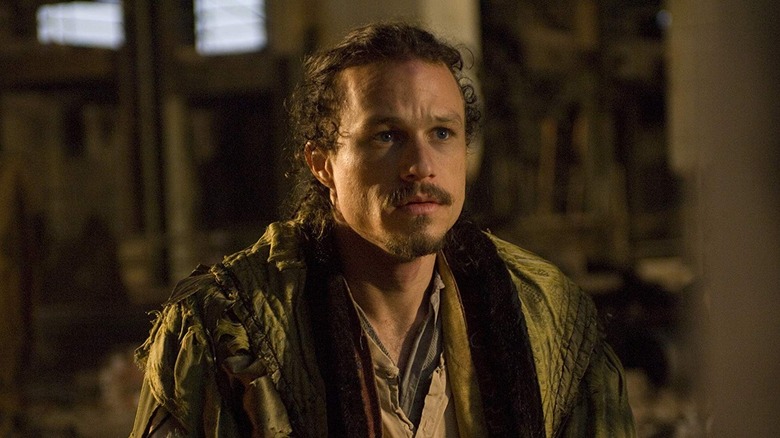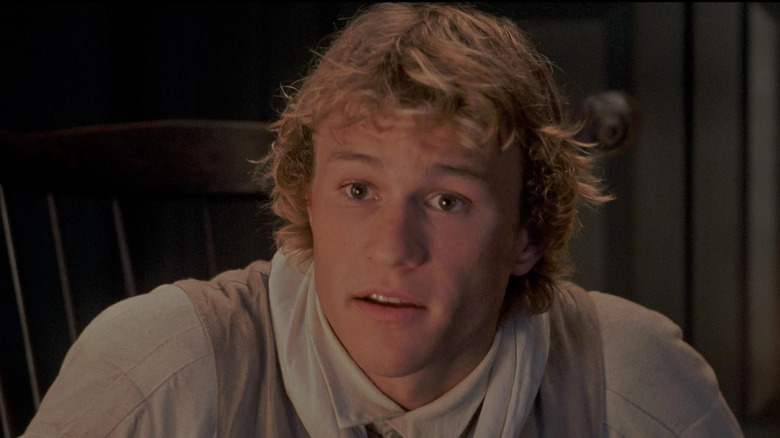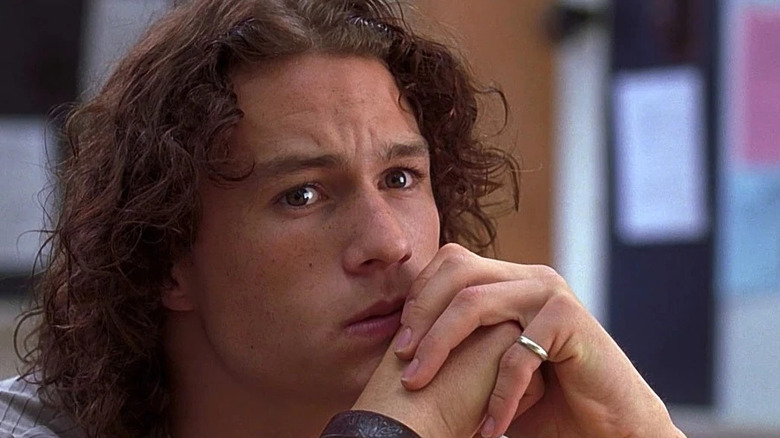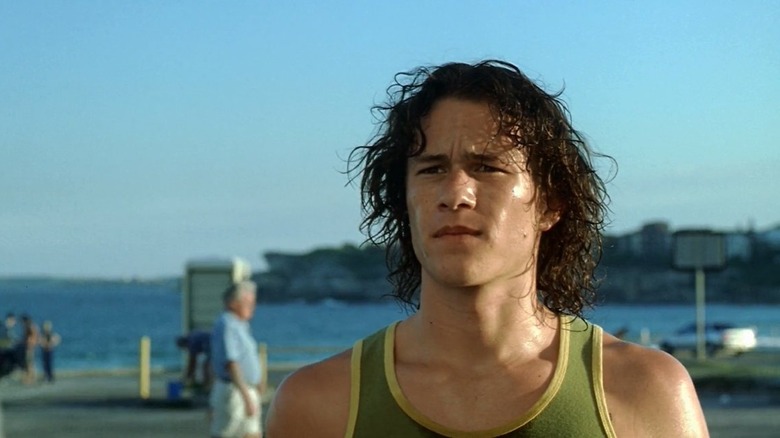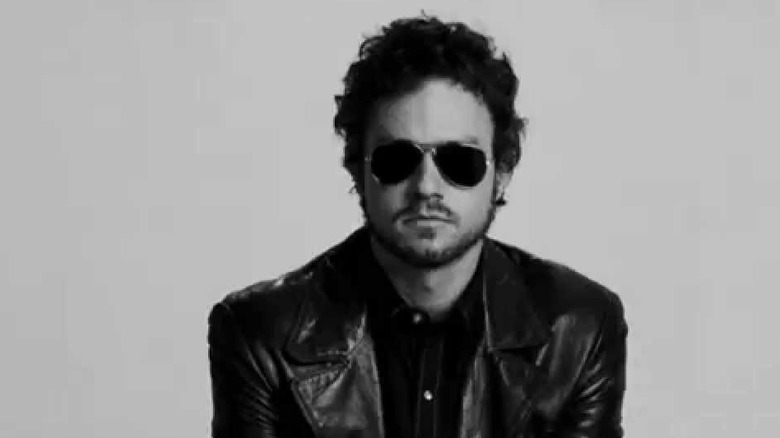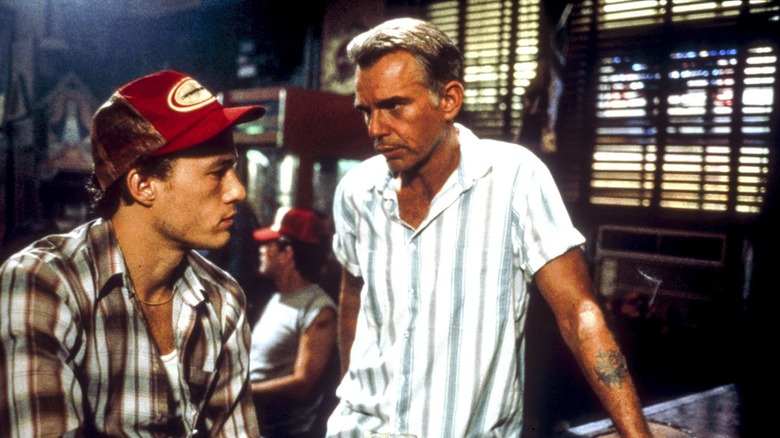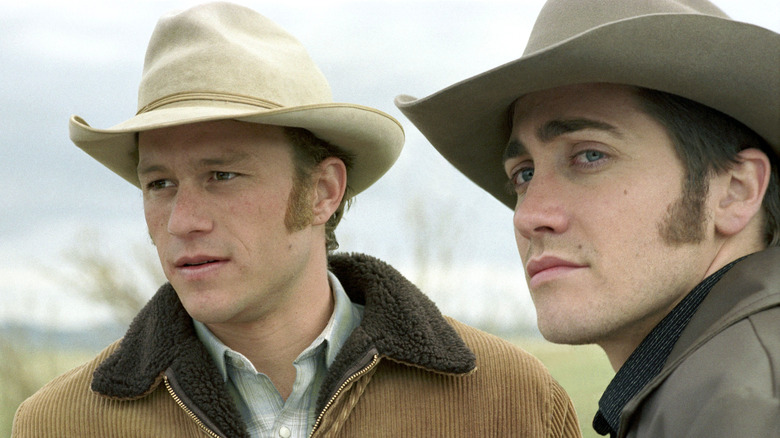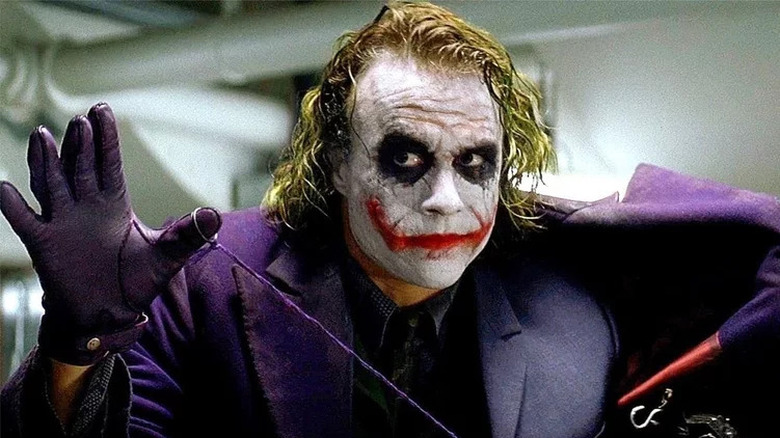All 18 Heath Ledger Movies Ranked Worst To Best
The phrase "gone too soon" is used to describe someone or something passing, but it implies that whatever's being described — a human life, a relationship, a TV show that got canceled after a season or two — had more to give than it got the chance to share. "Gone too soon" is a powerful act of empathetic imagination with a foundational belief that more greatness was possible. I mention that because when Heath Ledger passed, I remember thinking — and then hearing — that he had gone too soon.
Rewatching Ledger's filmography gives voice and meaning to that sentiment. The Australian thespian displayed once-in-a-lifetime charisma from the jump but married it to a burgeoning talent that blossomed. By the time Ledger won a posthumous Oscar for "The Dark Knight," it was clear that he had the skill to spare. All of a sudden, it was gone.
Ledger's movies aren't gone. We still have those. And while nothing can truly heal an irreparable loss, films are a good cause to celebrate, cry, and take stock of life. Ledger's resume offers 18 opportunities, good and bad. Here is every Heath Ledger film ranked from worst to best.
18. The Order
A low-key highlight of Heath Ledger's career was his loyalty to certain directors. Ledger worked with Terry Gilliam twice. He also worked with Brian Helgeland twice. The Oscar-winning writer-director helmed Ledger's iconic hit, "A Knight's Tale," and years later, Helgeland reunited much of that film's cast (Ledger, Shannyn Sossamon, Mark Addy) for an entirely different affair. If "A Knight's Tale" is a carefree mash-up in the vein of "Girl Talk" or "Danger Mouse," then "The Order" is Neurosis-like sludge metal.
That isn't a compliment. "The Order" would be enthralling if there was any tension in its dirge-like pacing. But the story of a disillusioned priest (Ledger) who travels to Rome in the hopes of solving his mentor's murder never even approaches liftoff. It never shifts gears out of "gloomy." While watching it, one hopes that it will miraculously transform into a fun misfire rather than a leaden one. As with the film's characters, those prayers are never answered. Skip this one.
17. Paws
Reader, to be transparent with you, there were one or two Heath Ledger films I had never seen before assembling this list. "Two Hands" (which we'll discuss later) is one of them. "Paws," an Australian family comedy about talking dogs that features the vocal talents of Billy Connelly and a man getting killed in a stairwell, is the other.
"A man getting killed in a stairwell" isn't the most violent or strangest thing that happens in "Paws." A child makes a computer program that can translate anything into human language, and his first instinct is to apply it to the stray dog he just took in, a dog who — again, voiced by Billy "The Boondock Saints" Connelly — informs him of a tech conglomerate cover-up. This all happens in the film's first act.
It is imperative to inform you that "Paws" is far more fun to read about than watch. It's also less than a footnote in Ledger's storied career. The good news is that, like me, you probably haven't seen "Paws" and now isn't the moment to change that.
16. Casanova
Within Heath Ledger's body of cinematic work, there is a separate and lesser body of work, a run of films that could be generously called "handsome Heath Ledger pictures." This title works on multiple levels. Heath Ledger was an attractive human, and each of these movies banks on Ledger's charm and looks to carry the day when their individual stories lag. Each of these films is also handsomely shot. But none of them — from "The Four Feathers" to "Ned Kelly" to "Casanova" — work as pieces of cinema. Each feels like they should and creates a cognitive dissonance while viewing them. It isn't enough.
Of these three (and "The Patriot," but more on that in a bit), "Casanova" is the most egregious offender in so far as its lavish aesthetics serve to neuter its story. The real Casanova was bisexual and had multiple relationships with many individuals. The love of his life was a cross-dressing violinist who fled an abusive husband and was ultimately ripped from Casanova's arms. None of that occurs in Lasse Hallström's movie. Instead, he serves up a traditional rom-com in period clothing with a lothario protagonist whose dalliances lack eroticism. That's practically the least satisfying "Casanova" movie imaginable, and so it barely charts on this list.
15. The Four Feathers
Every element of "The Four Feathers" should be better than it is. Consider that the 2002 retelling of the 1939 British imperialist classic comes from Shekhar Kapur, who directed 1998's "Elizabeth" and cast a loving but critical eye on the country's colonial history. It stars a quartet of talented actors in their primes (Heath Ledger, Kate Hudson, Wes Bentley, Djimon Hounsou) and has money to spare for its lavish battles and settings. Little of that matters. "The Four Feathers" gives in to its most dated elements and asks each of its core performers to take on roles they're truly not suited for. Bentley excels when striving for naturalism. "The Four Feathers" is costume-drama heightened. Kate Hudson has chops, but they aren't suited to period pieces. Hounsou, coming off his searing work in "Amistad," is reduced to a trope. Ledger fares the best of the four, but you can see the strain in his work. It should all play better. It doesn't.
"The Four Feathers" isn't a miserable viewing experience by any means, but it is a cringe-inducing and laborious one. If you haven't seen it, you don't have to.
14. Ned Kelly
"Ned Kelly" was a viable attempt to make a traditional movie star of Heath Ledger because its subject, a legendary Australian outlaw, is a perfect traditional movie star role. It requires commitment, charisma, and gravitas. Taking Kelly on means embodying a national folk hero and making his story feel relevant, if only through one's performance. On that front, Ledger mostly succeeds. Ned Kelly is portrayed as a man who never stops trying, right up until his dying breath. The part doesn't fit Ledger like a glove so much as he makes the glove fit. "Ned Kelly" is illustrative of why more emotionally complicated and less overtly dashing roles as in "Brokeback Mountain," "The Dark Knight," and strangely enough, "10 Things I Hate About You," better channeled Ledger's innate stardom.
As for "Ned Kelly" the movie, the film means well but submits to histrionics in place of actual drama too often. It's a story worth telling, told in too-broad sweeps. Like Ledger as Ned Kelly, the fit isn't right.
13. The Brothers Grimm
There's nothing about "The Brothers Grimm" that isn't bizarre. It's a bizarre Terry Gilliam picture, not because it's strange or unusual but because its singular production woes seem to have manifested on screen. "Grimm" was a disaster from the jump, a film financed by the Weinsteins at the height of their toxic movie mogul powers and helmed by the notoriously difficult Gilliam. "I'm used to riding roughshod over studio executives," Gilliam explained to Time Magazine in 2005, "but the Weinsteins rode roughshod over me." Filming shut down for weeks at a time. The cinematographer was fired. It's a miracle "The Brothers Grimm" was finished.
That film has its highs and lows. It's a joy to watch Heath Ledger play in Gilliam's dark fairy-tale world, and the action sequences are bonkers enough to be interesting. However, the film, by and large, feels like the rough draft of a better picture that might be even better if different talents were involved. That's the opposite of the happy ending "The Brothers Grimm" deserves, but maybe it's fitting. Grimm's fairy tales were pretty dark to begin with.
12. Blackrock
"Blackrock" is a humble but starling gut-punch of a motion picture. There's no other way to describe a movie that was seemingly made on a shoestring budget that begins with one character being sexually assaulted and then murdered and stars a predominantly teenage cast to boot. "Blackrock" stares into the void of youthful indiscretions and their sometimes hellish consequences. It does not shy away from them.
Calling "Blackrock" a Heath Ledger film is a bit of a stretch. It's his feature film debut, and he excels in the role of Toby, a surfer kid whose attempts to hook up with girls at a party take several menacing turns. Comic book fans were surprised when Heath Ledger was cast as the Joker. Had they seen "Blackrock," their shock might have abated. Ledger's Toby isn't calculated or chaotic, but his heart of darkness is remarkably similar. That alone makes "Blackrock" a hard but worthwhile watch for Ledger completionists.
11. Candy
"Candy: A Novel of Love and Addiction" by Luke Davies is loosely based on the author's battles with drug abuse. "Candy" the movie is an adaptation of Davies' novel. Those kernels of truth at the core of the film's plot concerning a pair of lovers (Heath Ledger and Abbie Cornish) pushed towards creative drug use by a kindly professor (Geoffry Rush) give "Candy" an unexpected power. The film isn't perfect, but it feels rooted in honest feelings and experiences. That isn't enough to make it great, but it does make it resonant.
The other elements "Candy" has going for it are Ledger and Cornish. Ledger was an underrated co-star, the sort of actor who didn't just elevate anyone he shared the screen with so much as he made room for them. He lets Cornish's crackling, electrical-storm charisma and out-of-left-field intensity both mirror and contradict his own. There is no doubt as to why or how Candy and Dan fall in love, and honest affection is the engine that helps "Candy" roar towards a satisfying finish.
10. Lords of Dogtown
"Lords Of Dogtown" isn't the best entry in Heath Ledger's filmography, but years after his passing, it remains one of the most moving. Catherine Hardwicke's film, which dramatizes Stacy Peralta's 2001 documentary "Dogtown and Z Boys," is a monument to the recklessness of youth. Few directors in the 21st century have ever chronicled that more visibly than Hardwicke, but in "Dogtown" she shifts her eye to teenage boys specifically. The results are mesmerizing. "Dogtown" begins as a chronicle of skateboarding and young male bravado but finishes as a bittersweet acknowledgment of mortality. The three skaters at its core (Emile Hirsch, Victor Rasuk, and John Robinson) fall out after their initial successes and only reunite because their mutual friend, Sid (Michael Angarano), falls ill. His condition is terminal, and the film doesn't shy away from depicting this. In this way, youth culture runs into the all-too-common ending of youth stolen. It's almost impossible to watch "Dogtown" slump towards its conclusion without considering Ledger's own life and death. The Z-Boys believe, however briefly, they're invincible. It's what we believe when we watch movie stars light up the screen. Ledger's presence and life prove both the magic and fallacy of this way of thinking. And both are on display in "Lords of Dogtown."
9. A Knight's Tale
Whether you have or haven't seen the movie, watch the trailer for "A Knight's Tale" before you read any further. That trailer, independent of Brian Helgeland's clunky but ecstatic medieval joust picture, is the last brilliant gasp of the '90s. Chuck Klosterman writes that decades don't begin on their relative January 1sts — they start and end with moments. The '80s are over when the Berlin Wall falls. 9/11 birthed the 2000s. "A Knight's Tale" exists in the 19-month gap between 1999 and that national tragedy, when it was cool not to try too hard and anachronisms could constitute "vision." It was born of the decade's overwhelming ambivalence and underwhelming excess. At no point does "A Knight's Tale" ask why it should open with medieval serfs jamming to "We Will Rock You." It is built from and for a different question: "Why not?"
I haven't written about whether or not "A Knight's Tale" is good because, honestly, that's almost beside the point. If you want to see a jousting film by way of peak MTV, you should watch it. If you want to watch Heath Ledger, Alan Tudyk, and especially Paul Bettany cement their star power in real-time, you should watch it. Don't ask "why?" Ask "why not?"
8. The Imaginarium of Doctor Parnassus
It's hard to hate a film that exists to pay tribute to Heath Ledger. That wasn't the intended storytelling thrust of Terry Gilliam's "The Imaginarium of Doctor Parnassus," but that's what it became when Ledger died midway through filming. The plot concerns an aging theater troupe leader (Christopher Plummer) who makes wagers with the devil (Tom Waits) and a disgraced philosopher named Tony (Ledger) caught between them. That's not why you watch "Parnassus." Gilliam's picture was nominated for two design-centric Academy Awards: one for best art direction and best costumes. It's easy to see why. The movie is a visual feast that is as meticulously textured as it is chaotically playful. That's not a surprise given Gilliam's filmography, but the film's vacillations between 1800s London and strange, technicolor worlds are still pleasing.
The other highlight, of course, is a cadre of Ledger's friends and fellow actors interpolating his work. Every time Tony travels through the Imaginarium to a different dream world, his appearance shifts to that of Johnny Depp, Jude Law, or Colin Farrell. All three thespians do magnificent work under unimaginable circumstances, and it's clear how much each player wants to give to Gilliam's project. As Ethan Hawke noted in a recent interview, "there are movies that people put their heart into and there are movies people try to cash in on." In the wake of Ledger's tragic death, "The Imaginarium of Doctor Parnassus" is the former.
7. The Patriot
Roland Emmerich doesn't make movies about people. He makes movies about people fighting impossible forces. In "Independence Day," we the people, fight for our right to exist by battling a race of landmark-destroying aliens. "The Day After Tomorrow" is Jake Gyllenhaal fighting climate change (but with tidal waves). This is why "The Patriot" is ridiculous. As realized by Emmerich and "Saving Private Ryan" writer Robert Rodat, the British Army is on a level with a world-collapsing cataclysm ("2012") and aliens posing as Egyptian gods ("Stargate"). The whole movie feels overblown as a result. It also rules!
Make no mistake. Scrutiny undoes "The Patriot," but there is little time to analyze anything between the film's breathless bouts of action and Mel Gibson and Heath Ledger's scenery-chewing, let alone Jason Issacs mustache-twirling turn as the pernicious Col. Tavington. "The Patriot" is gorgeous sensory overload. It's silly. It's borderline stupid. It plays like gangbusters on the 4th of July or late at night after one too many libations of choice. People fighting and beating the impossible is an American dream. "The Patriot" sells it with wholesale showmanship.
6. 10 Things I Hate About You
The rise of Olivia Rodrigo and Machine Gun Kelly's pop-punk phase isn't proof "10 Things I Hate About You" is good. They do suggest it's essential. Gil Birmingham's breezy film is more indebted to the decade's riot grrrl and mall rock subcultures than any other teen comedy the late '90s produced. Letters To Cleo play the third-act prom sequence. The movie deliberately reimagines Bianca from "The Taming of The Shrew," one of Shakespeare's most silver-tongued and remarkably drawn heroines, as a high schooler. Avril Lavigne doesn't get her platform without it, and if it isn't a guidepost for the early aughts renaissance in current music and pop culture, it's an incidental one at least.
Thankfully, "10 Things I Hate About You" is a treasure beyond its relative influences. It is the movie that makes Heath Ledger. You could practically put clips of his character, Patrick, flicking his fingers through an open Bunson burner flame or singing "You Drive Me Crazy" on the bleachers next to the dictionary entry for "movie stardom." More importantly, it's a film as quietly in love with language as it is pre-Avril aesthetics. The script by Karen McCullah and Kristen Smith is deliciously quotable (my favorite: "My fenders don't really whip me into a verbal frenzy.") and reinforces learning the language of someone's heart and head to love them. That makes it a movie for the ages, not just the decade which bore it.
5. Two Hands
Whether American audiences realize it or not, Heath Ledger the movie star doesn't happen without "Two Hands." It was the movie Heath Ledger made right before "10 Things I Hate About You," and it almost acts as a case study on why he would become huge.
Gregor Jordan's crackling crime-rom-comedy revolves around Ledger. It doesn't just make him the sun of its universe. It adopts his gravity and feeds off his oxygen. As Jimmy, a young criminal both in debt and in love, Ledger is the ideal mix of incessantly charming and casually threatening. We want to be him, even as there's no world in which we'd step into his shoes at any point. "Two Hands" sends Jimmy off and running to get right with crime lord Pando (Bryan Brown) by planning and executing a disastrous bank robbery. The robbery sequence soars. Jimmy's whirlwind courtship of Alex, played by a fresh-faced but still brilliant Rose Byrne, soars. Watching "Two Hands" is enough to make you mad crime films this casually excellent aren't a more regular cinematic experience. That and Ledger are why it's worth celebrating.
4. I'm Not There
The musical biopic has been done to death and then parodied within an inch of its life. You need only look at "Bohemian Rhapsody" and "Walk Hard" for proof. This summer's "Elvis," which has been called a "deliriously awful" by some and features Tom Hanks doing a dialect seemingly pulled from another dimension, suggests it's difficult for even seasoned filmmakers to shake this formula off.
Maybe that's why "I'm Not There" is so revelatory. Todd Haynes glowing, strange, and incisive look at Bob Dylan finds a singular convention for its storytelling: casting multiple actors as Bob Dylan at different points in his life. These castings are gender and age-fluid. They seem emotionally driven. For a musician who shaped the musical landscape of the turbulent 1960s, that decision is spot on. Haynes' film finds distinct visual languages for each Dylan, creating a film that's as kaleidoscopic in tone as the artist whose discography it pulls from. While Cate Blanchett understandably gives the Dylan performance most remember, Heath Ledger deserves special mention as well. He plays Dylan during one of his most troubled stretches in a moment when he was struggling with art and existence. The performance feels close to the bone. It transcends the biopic genre.
3. Monster's Ball
"Monster's Ball" knows the power of pain. Every frame is rife with it, whether it's the physical pain prison guard Hank (Billy Bob Thornton) inflicts and witnesses on death row or the painful racism Hank's father Buck (Peter Boyle) spews nightly. And that's to say nothing of the anguish endured and served up by Leticia (Halle Berry), a Black woman living in the South who verbally abuses her overweight son (Coronji Calhoun) and has a husband named Lawrence (Sean Combs) awaiting execution. If you've figured out that Lawrence will connect Hank and Leticia, you're on the wavelength of "Monsters Ball." If you imagine it will be a treatise on race or overcoming prejudice, you've underestimated it. "Monster's Ball" looks beyond easy narratives and genuinely asks what it means to see the pain of others and what kind of growth is possible for people (and society, by extension) if we do. There are no simple answers in "Monster's Ball." That's part of what makes it excellent.
The other part? It's cast. It's impossible to say too much about what Halle Berry achieves as Leticia. The performance earned her an Oscar, but an award can't convey the blood and sweat she sheds to bring Leticia's troubles, flaws, and quiet hopes to life. Ditto for Heath Ledger, who finds a gear for Hank's son, Sonny, that's both maudlin and rage-filled. It's not the role Ledger is most celebrated for, but it burns into memory nonetheless.
2. Brokeback Mountain
In the 21st century, the annals of pop culture are also those of history. The two are impossible to separate. Whether we like it or not), the Johnny Depp and Amber Heard trial will define who we were as much as inflation and America's lasting gun crisis. Our culture's attitudes are revealed and reshaped through pop culture artifacts. That's why it's impossible to discuss "Brokeback Mountain," Ang Lee's sweeping queer Western, without mentioning that every element of it briefly became pop culture. Most importantly, it radically offered the sight and beating hearts of two queer, masculine men loving each other. Some audiences tried to turn their most searing moment (Jack Twist's angry and heartfelt, "I wish I knew how to quit you") into a gag. Its stars shut those jokes down. That proves that a movie like "Brokeback Mountain" matters as much for existing at the visibility level as it does for being good.
The thing, though, is that "Brokeback Mountain" is great. Its deconstruction of American machismo and delicate exploration of queer male intimacy are as sweeping as the Western landscapes which envelop it. For all the praise Heath Ledger and Jake Gyllenhaal get, Anne Hathaway and Michelle Williams are revelatory. "Brokeback Mountain" is a film about America that some Americans still struggle to reckon with because it's pop culture and true and excellent. That makes it a miracle.
1. The Dark Knight
"The Dark Knight" tries to tell us who the Joker is. His jokes are bad. He's more interested in sending a message than having money. Most importantly, the Joker is not a freak. For a character whose legacy is a terrifyingly deep and opaque evil, Heath Ledger's "Clown Prince of Crime" has crystal clear desires. It's their power that clouds them, and that gloom is a safety net. The Joker is scarier if his aims are more focused than chaotic. If a guy like that knows what he wants, the world is his oyster to shuck at his whim.
You may have noticed I'm writing more about the Joker than "The Dark Knight," and that's by design. This is an article about Heath Ledger's best movies, and there is no "The Dark Knight" without Heath Ledger. It is shaped by his magnetic performance and inextricably linked to his untimely loss.
The Australian actor's work is so shining that it has become the sun around which comic-book movie villainy orbits. There have been three Jokers since him, and they are all, in different ways, returning to the well Ledger drew from. They are all trying to understand a thesis Ledger spoke plainly. The only sensible way to live in this world is without rules. In "The Dark Knight," Ledger ripped up and rewrote the rulebook forever.
